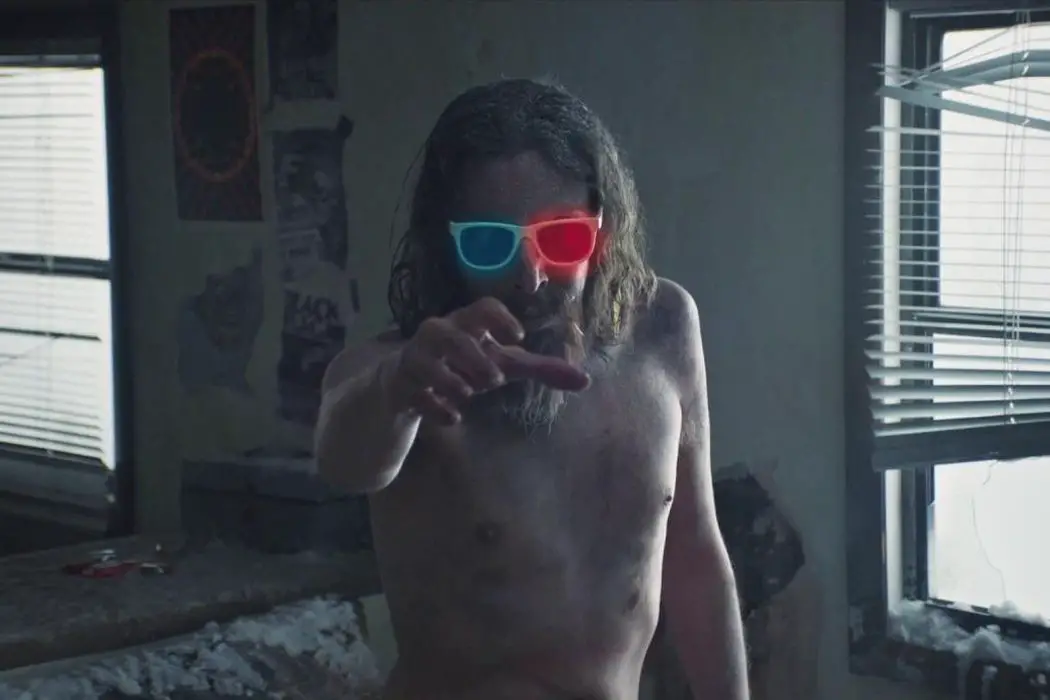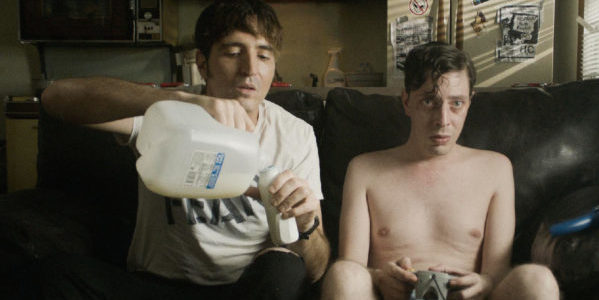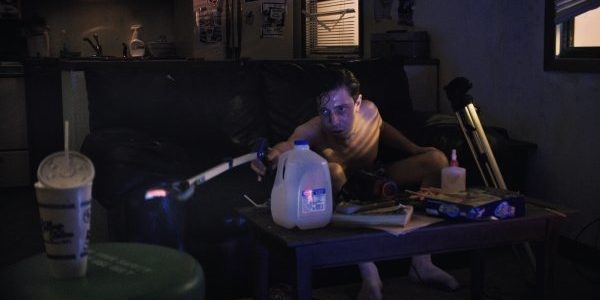Video Dispatches: Interview With Joel Potrykus

Midwesterner, movie lover, cinnamon enthusiast.
Powerhouse Films, the company behind the home video label Indicator, is now home to Anti-Worlds, a label dedicated to the same high level of home video presentation but for recent releases. One of their first releases is Joel Potrykus’s Relaxer, which comes with the filmmaker’s earlier film Buzzard.
Potrykus hails from Alpena County, Michigan, a tiny division of rural cities and villages in the midwestern United States that, together, account for less than 30,000 people. Unsurprisingly, there’s a backyard, grassroots energy running through his corpus that we rarely get to see in widely distributed films.
Potrykus refers to his filmmaking troupe, Sob Noisse, as a band, and even as he and his collaborators change locations and work with higher budgets, that energy remains — of hometown friends making shit for fun. It’s the energy that the judges of the 2012 Locarno Film Festival surely saw in his full-length debut, Ape, when they awarded Potrykus the Best New Director Award.
When I recently met Potrykus at Grand Valley State University, the Grand Rapids, Michigan-based college where he teaches film, he told me the idea was never to be a filmmaker. He wanted to make one film, have it play a bunch of festivals and be done.
Oscilloscope: A Filmmaker’s Dream
Now Potrykus is four full-length features (and a handful of shorts, some of which are included on the Anti-Worlds release) into a career and has a filmmaker-producer-distributor relationship many directors would kill for. Oscilloscope, the label founded by former Beastie Boy, the late Adam Yauch, has produced and distributed all of Potrykus’s films since 2014’s Buzzard .
He said their relationship was simply a product of his own targeting; he was psyched once he heard someone from the Beastie Boys was starting a film company, “I would just go on their website, like that Contact Us page, and like, ‘My name is Joel and I live in Michigan and someday I want to have you guys put out my movies.’ I’d never get a response but I was like, whatever it’s an info page.”

Once Buzzard premiered at the 2014 South By Southwest, he was able to finagle a meeting with Oscilloscope. While agents and managers at the festival, according to Potrykus, are used to filmmakers wanting to secure distribution with Universal or some other large distribution company, he was dead set on this one small label, who happened to be into the film about an office temp and small-time scam artist who flees from his small town to Detroit, paranoid his company is onto his latest grift.
Since then, whenever Potrykus has a finished script, he emails Oscilloscope a prospective dollar amount for the budget — sometimes to their disbelief, since he insists on making movies in Michigan, instead of New York or Los Angeles — and they go from there. He completely trusts them to handle the marketing and distribution in a way that satisfies both parties.
“They just get it,” he said. “They’re the executive producers on these movies now and it’s pretty low maintenance. I don’t even think we signed contracts, but it’s just total trust … everybody understands what’s up. It’s all I’ve ever wanted in my life, to have that kind of relationship,” he said before comparing it to Dischord Records, the D.C. record label co-owned by Minor Threat and Fugazi legend Ian MacKaye. “It’s like, let’s just trust this is about getting out there and challenging audiences [while] doing something cool.”

Potrykus is grateful for the relationship because he’s never wanted to go to a large company like MGM and pitch an idea.
Teacher First, Filmmaker Second
“It just sounds awful to me — the red tape and people in suits and ties, and just … I have a job, you know, this is my job,” he said, referencing the university office where we sat. “[Filmmaking has] never been about making the most amount of money, it’s just making sure to connect.”
In response, I mentioned Kelly Reichardt, a fellow Oscilloscope-distributed filmmaker, who has been very open about her professional status as a film professor, not a filmmaker, which she does on the side. This distinction, not relying on filmmaking for income, allows her to secure final cut and make the films she wants to make.
In that light, I wondered if independent filmmaking — a definition that has admittedly lost most meaning during this century — is only possible as something done adjacent to an actual career.
“I think so,” he responded, calling Reichardt his filmmaking model and Wendy and Lucy the first Oscilloscope film he saw. He and his cinematographer watch it before making every film. “I think teaching film helps me become a better filmmaker.”

Before teaching, Potrykus was working at a mortgage company, which he called “awful and painful,” but teaching allows him to involve students with his filmmaking. As we spoke, his students were passing him script feedback under the door on scenes for a short film they’re making as a class. “It’s just awesome; it’s like this perfectly functioning organism where they’re getting things and I’m getting things and they’re learning and I’m learning.”
Potrykus said his teaching reflects his filmmaking style, “I start the first day of class like, ‘All right, you’re learning the Potrykus school of filmmaking,’ whether it’s script writing or directing or whatever, they’re getting my perspective on how to make something.”
The Eye of a Hurricane
Though he’s not making a blockbuster anytime soon, Potrykus gives off a less-than-subtle sense that he’s nostalgic, with regard to filmmaking, for the days of Ape and Buzzard , when the equipment was simpler and the crews even smaller — when the Sob Noisse crew didn’t have careers or families and met every week to “jam” on projects.
After Buzzard, Potrykus said he started making bigger budget films because he thought having a larger crew would make the process easier. Unfortunately, it has had the adverse effect, “I mean, I love having them around but as far as my anxiety, I think it’s more difficult.”
In 2019, Potrykus wrote an article for Filmmaker Magazine detailing the immense anxiety he experienced while making Relaxer. Though already slight in stature, he lost 15 pounds during the shoot from an atrophied appetite, suffered a severe panic attack or two and spent time in the emergency room.
When I asked if that feeling of debilitating stress and anxiety was something that was still weighing on him, as he anticipates future projects, the answer was a definitive “yes.” He said he’s reached out to other filmmakers to see if they’ve dealt with the same symptoms, but all he gets is a “Yeah, it’s stressful.”
Earlier in the conversation, I brought up Paul Schrader, a fellow Michigan filmmaker who grew up in Grand Rapids — where Schrader’s second feature partially takes place. Potrykus makes blatant homage to Schrader’s most famous creation, Travis Bickle, in his own film of a disenfranchised, temperamental young white man, Buzzard. He pulled up an email he recently received from Schrader — a reply to Potrykus asking about filmmaking stress.

Schrader told him, vaguely, that filmmaking “feels like being in the eye of a hurricane.” Potrykus has had trouble deciphering what exactly that means for Schrader — does he enjoy being in the eye of a hurricane, is it something he similarly struggles with, and if so, how does he get through it? A reply asking for clarity didn’t yield a response.
“He’s a dark guy and he’s struggled with his own demons and I just wanted him to be like, ‘Yes, I just want to kill myself every time I’m shooting a movie but I’ve got to do it,’” said Potrykus.
He told me the script for his next full-length film is finished, and unsurprisingly, he wishes it was done already. After this one, he claims he might be done making feature films.
“My Michigan”
Considering the regionally specific texture of his films, particularly something like Buzzard, and Anti-Worlds’ release in the UK, I asked Potrykus what he thought of the prospect of people outside of the states seeing his work. He said he loves it. And though he recognizes the cliche and cop out of filmmakers who claim their work is going to translate better in Europe, a part of him really does believe that, citing his award at Locarno.
“I’m trying to make these European art house movies that are just like in Michigan with a Michigan kind of like flavor and Michigan characters but I want them to look like a Michael Haneke movie,” Potrykus told me.
When he traveled with Ape, Potrykus said non-North American audiences thought Michigan was exotic, claiming they’re so used to Los Angeles palm trees and the streets of New York City, “They were just really obsessed with Michigan and asking if we spray painted the walls and emptied the streets and, like, no, it’s just what Michigan is. I didn’t even know, that was kind of the first time I [noticed it] and I didn’t I didn’t even think of that consciously, but that’s what people are seeing and noticing… that there’s this Michigan landscape. It was kind of like, yeah, I’m definitely not going to L.A. now. I want to be the Michigan guy that’s showing people what my Michigan looks like. That’s important to me now.”
Does content like this matter to you?
Become a Member and support film journalism. Unlock access to all of Film Inquiry`s great articles. Join a community of like-minded readers who are passionate about cinema - get access to our private members Network, give back to independent filmmakers, and more.













